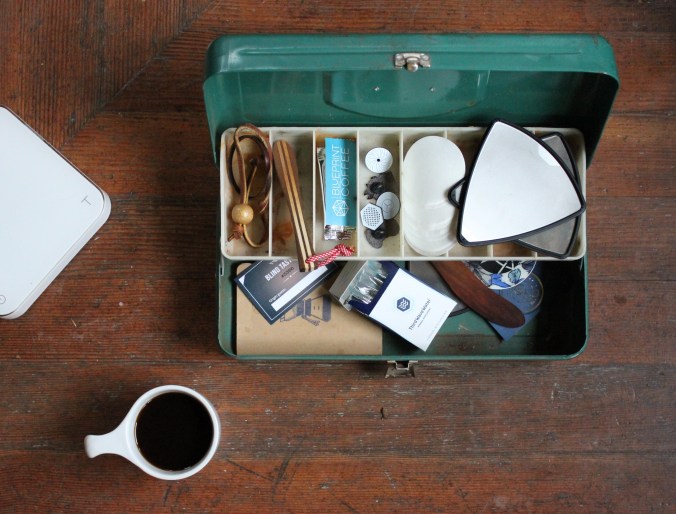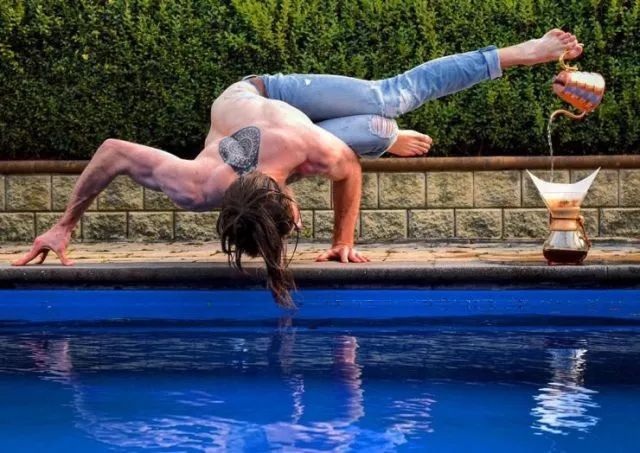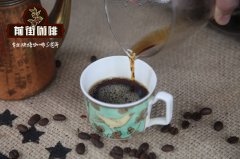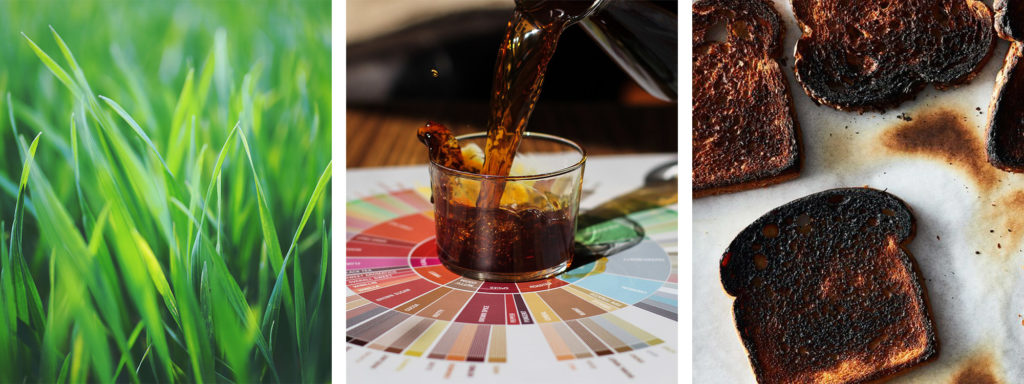[handmade coffee repair kit] Why is your coffee still not good?
Professional coffee knowledge exchange more coffee bean information please follow the coffee workshop (Wechat official account cafe_style)
With the increasing popularity of hand-brewed coffee, many coffee lovers will choose to have a set of hand-brewed coffee utensils at home or in the office and take advantage of their spare time to take a brew. But there is often a situation: after many people make too much coffee, they will have a sense of "idleness" and "numbness" to their hand-brewed coffee: they always feel that they do not have the passion and surprise of the past.
Perhaps it is because the long-term hand cooking has not brought about the desired rapid progress, and even the more rushed it is, the more "it feels" wrong. Don't worry, there's still hope. Whether it's a novice or a bottleneck, here are a few tips to help you improve the quality of your coffee and rekindle the passion and vitality of your opponent.

If you already have a certain base of hand-brewed coffee, it should be easy for you to fix a cup of bad coffee. A word of warning: making coffee at home is a winding road, which is blocked and long. The more you explore, the deeper you get into the pit. In the early stage of practice, you still need to often go out to learn other people's experiences and experiences and communicate more. If you are a novice, please do not be intimidated by these words, the core theme of this article is actually only one: it is easy to make coffee by hand.
"Save the child! My coffee never tastes good! "
The first point of self-improvement is to learn self-reflection. Take a moment to think about your situation first: what's wrong with cooking? Why do you think there's something wrong with your coffee? What's the point you don't like? What changes can you make?
Don't be too verbose. It is of course useful to answer these questions. If you can ask questions correctly, the answer is not far away.
For a coffee lover who brews coffee at home, the reason for improving the quality of coffee should be intrinsically motivated. if you like your own coffee, but others don't like it, there's no need to change it at will. just make your own favorite coffee, who has an opinion, let him rush it by himself--
If you don't like your own coffee, change it. Even if your opponent doesn't know anything about making coffee, even if you're not sure if you're good at brewing it, it's better to change than to keep the status quo.
Torture from the soul
Before you gnash your teeth to buy a coffee refractometer worth thousands of yuan, check to see if there is any other infrastructure missing in your home. This article has no groundbreaking tools and ideas, only some basic principles of making coffee, which are worth reading carefully.
There are some cooking principles, even if you think you are out of the novice village, it is worth reviewing, because you never know when you will ignore some details.
One: you can't make something out of nothing.
First of all, you need to find your own favorite coffee. If you don't like the kind of coffee you drink now, there is no need to adjust or correct it.
To improve the brewing skills of coffee, start by making your favorite beans. You can try different coffee shops, even if you step on mines, if you really don't know where to start, please ask the barista or the relevant customer service staff directly.
Sometimes there is a simple explanation for bad coffee brewing: you may not like the beans you are brewing at all.
Two: water is everything! (accounting for 98.75%! )
The soluble matter that makes up a cup of coffee actually accounts for only a very small percentage, and most coffee is 98-99% water. This means that your water is actually a very important factor.
If you don't like the taste and taste of the brewing water (yes, the water is also tasteful), it's not surprising that you don't like this cup of coffee.
If you suspect that there is something wrong with your cooking water, you might as well try some mineral water. As for pure water and distilled water, it is not recommended. There is also a "coffee water" on the market, which is a "formula water" that adds specific minerals to distilled water or reverse osmosis water, which is conducive to coffee extraction and flavor display. Objectively speaking, "coffee water" is suitable for most people and coffee, but not all.
Three: do you have the right equipment?
Depending on your choice of cooking method and utensils, you may need to put in some additional equipment to assist in cooking in order to make it better. Although it is not a rigid rule, the general equipment for making coffee by hand includes an electronic scale, a thermometer, a hand pot and a bean grinder.
Electronic scales and thermometers are irreplaceable, whether you learn Japanese brewing or European and American style, accuracy and consistency are the requirements that must be met-if you really want to learn to make coffee by hand, please don't save a little money and effort.
The importance of the bean grinder needless to say, what level of bean grinder, what level of coffee quality. It doesn't matter which brand of bean grinder to choose, just buy the most expensive one within the budget.
In many brewing utensils, there is no special bonus for matching a hand pot (for example, French kettle, smart cup), but as a general drip coffee brewing, a handy hand pot is essential.

Self-study and experiment:
If you have found your favorite beans, suitable water and utensils, and you still want to adjust and correct your cooking quality, then you need a long-lasting scientific research.
Everyone's brewing situation and coffee taste are different, really suitable for their own brewing technology and only through continuous experiments, tasting, summary and practice can be practiced.
Record everything.
Set up your own cooking notes so that you can summarize and improve yourself most quickly. You don't have to record every cooking, but the more data you record, the more data you can check later, and it can also help you sum up some personal experience and self-correction.
There are some data in the brewing notes that must be recorded clearly: the coffee beans you are brewing, the grinding scale, the water temperature, the total cooking time, and whether you like the results.
Other data can be chosen by yourself: coffee baking date, stirring, stirring times and amplitude, mood at the time of brewing, indoor temperature and humidity, wind direction, weather and altitude.
Did you do anything extreme?
Is there anything different about your cooking technique? When you have your own cooking notes, you can easily find out the differences with others by looking through them.
You can learn from other people's cooking techniques, find one or two cooking techniques that you like or are interested in, and write down other people's parameters: powder quantity, water temperature and cooking time; if you have data on the size of coffee powder, try to be as close as possible. You can compare whether other people's parameter choices are beyond your own ideal range?
If your hand parameters are very different from others, for example, the time is too long or too short, the water temperature is too high and low, and the ratio of powder to water is high or low, you can try to cook the control experiment with different parameters. Can you tell which method is better or worse for yourself?
Write it down in your own notebook, what parameters have you changed, better or worse?
Remember, don't change multiple variables at a time. First adjust one parameter, and then adjust the next. In each experiment, just find out which parameter you like best and fix it.
So, let's do some more extreme experiments.
Sometimes, you can deliberately make some very bad coffee to taste. This is not necessarily a waste, sacrifice a bag of coffee beans, you can improve your own cooking skills, how cost-effective!
If you're still not sure what's wrong with your brewing skills, it's hard to find the answer in normally brewed coffee. You might as well try to make some coffee with extremely unbalanced or messy parameters (commonly known as "blind rush"). Maybe there is another village around the corner.
Extremely underextracted-to make a cup of coffee that is extremely underextracted, you can roughen the grind and switch to a low water temperature below 80 ℃. If it's a coffee brewed in a French kettle, you can halve the soaking time; if it's a filter cup, try taking only the first half of the coffee (don't waste the rest, then decide whether you want to drink it or not).
Extremely over-exquisite-on the contrary, you can fine-tune the grinding degree, switch to boiling water, soak in twice the length, drink only the end of the filter cup by hand, and add a lot of exaggerated stirring, whether it's soaking or dripping.
In addition, you can also use a variety of experiments to experience the performance and changes of coffee in different extraction environments, try to use different water, different powder-to-water ratio, different water temperature, different grinding degree. In short, break the standard limit of your opponent's coffee brewing parameters, break the golden law of your brewing system, do not be crazy, do not become a Buddha, do not break, do not stand. As long as you make a big enough change, you can understand the impact of this parameter and understand the definition standards and principles of this parameter in various cooking schools. As long as you understand the impact of various parameters on hedging cooking, you can accurately correct the specific parameters in a targeted manner.
Sum up experience
Going back to your introspection time, do you remember which beans you like and dislike? Every extreme experiment we do will bring you some parameters or experience refreshment. by constantly playing with coffee, you will gradually find your own brewing method and your favorite coffee taste.
Keep in mind that each packet of new beans brings new challenges, and the cultivation, processing, roasting and preservation of coffee can have a huge impact on coffee flavor performance. But don't let them scare you, as long as you start with your preferred fixed technique and make a small adjustment, no coffee bean can beat you.
Last
If you do encounter a "bottleneck", you can try to communicate more with other people, baristas, bakers, other enthusiasts, watching other people's cooking videos, and so on. Don't give up easily, there is no right or wrong to make coffee, only whether you like it or not. You will learn to make coffee, it must be because you like coffee, your own coffee may not be perfect, but it is definitely the most enjoyable.
Cheers!
END
Important Notice :
前街咖啡 FrontStreet Coffee has moved to new addredd:
FrontStreet Coffee Address: 315,Donghua East Road,GuangZhou
Tel:020 38364473
- Prev

Why are you flustered when drinking coffee? how to relieve the flutter when drinking coffee?
Professional coffee knowledge exchange more coffee bean information please follow the coffee workshop (Wechat official account cafe_style after drinking coffee flustered because coffee contains a substance called caffeine, is a xanthine alkaloid compound, has excited the central nervous system, temporarily drive away drowsiness and restore energy, when drinking more coffee, caffeine in the body
- Next

The development stage and color of coffee roasting-what is complete and incomplete development?
Professional coffee knowledge exchange more coffee bean information Please pay attention to the coffee workshop (Wechat official account cafe_style) Coffee roasting there are three floating roasting degree indicators: color, development and baking temperature. Today, let's put aside the temperature with the greatest difference and discuss the development and color of coffee. There are many color criteria about the degree of roasting in coffee roasting.
Related
- Beginners will see the "Coffee pull flower" guide!
- What is the difference between ice blog purified milk and ordinary milk coffee?
- Why is the Philippines the largest producer of crops in Liberia?
- For coffee extraction, should the fine powder be retained?
- How does extracted espresso fill pressed powder? How much strength does it take to press the powder?
- How to make jasmine cold extract coffee? Is the jasmine + latte good?
- Will this little toy really make the coffee taste better? How does Lily Drip affect coffee extraction?
- Will the action of slapping the filter cup also affect coffee extraction?
- What's the difference between powder-to-water ratio and powder-to-liquid ratio?
- What is the Ethiopian local species? What does it have to do with Heirloom native species?

